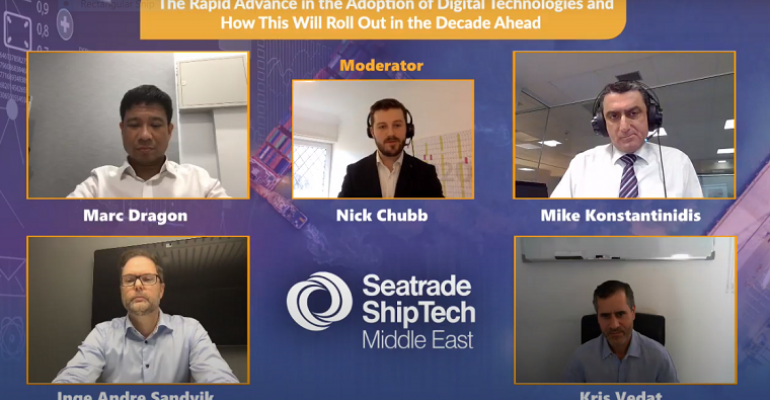The need for a business case in digitalisation and taking small steps were two areas highlighted Seatrade Maritime Middle East Virtual conference session: “The rapid advance in the adoption of digital technologies and how this will roll out in the decade ahead”, on Tuesday.
Kris Vedat, Head of Information Technology - P&O Maritime Logistics, said: “I think during Covid and 2020 a lot of people started to embark on digital initiatives, but there’s a danger to embark on digital initiatives for the wrong reason, and I think you still need to have a very strong business case attached to any initiative you embark upon.”
Looking at P&O Maritime Logistics own experience he explained, “That’s why when we started on our digital journey there was a business case document that identified several areas within the business we might target and focus on, and then we looked to various KPIs and what we wanted to achieve, and then enable technologies for that solution.
“I think one of the things I’ve seen in Covid is there is a rush to adopt digitalisation, but that maybe not the right digital tool is being implemented to solve the problem.”
In addition, there needs to be buy in from the business as a whole, and the ability to track value from the digital initiative.
“With the digital initiatives in place you’re able to start tracking more data and then get better value from that data and make better business decisions and obviously with Covid in place that enables resilience as well,” Vedat said.
Inge Andre Sandvik, Chief Digital Officer of Wilhelmsen Group, said there was a need for a new architecture for the industry as currently there were 60,000 ships with 60,000 platforms, compared to the mobile phone industry where there 6bn phones and two platforms.
“You need a different type of architecture that enables innovation much faster and continuous improvement of these services.
“Then you can really focus on the big problems, and problems that have a good business case where we see that we can invest, but not take huge risks. We can move much quicker in smaller steps, and as we know big changes start in smaller steps. That is the situation we have now, we are willing to adopt much quicker than we believe and are not as conservative as we think we are,” he explained.
Representing venture capital Marc Dragon, CEO of Reefknot Investments also agreed on having smaller initiatives with quick returns.
“It doesn’t necessarily need to be one big bang project, multi-year project to get things done. In fact, now having smaller initiatives which proves value and returns value rapidly using that investment to roll that is something the industry has started to learn how to do,” Dragon said.
Mike Konstantinid, Co-Founder and CEO - METIS Cyberspace Technology, made the point that while cash used to be king, that in our era data was king and cash maybe queen.
“It is important to ensure you do have reliable and frequent data flow from the vessels themselves to be able to have actual and continuous data from the various critical devices on the vessel. And then, you need to be able to enrich this data with third party data, weather data, and with other manual data.”
Once the data is cleaned, synchronised and stored properly advanced analytics can be employed to convert the raw data into relevant information, augmented with AI and the machine learning technology behind it.
Copyright © 2024. All rights reserved. Seatrade, a trading name of Informa Markets (UK) Limited.
Add Seatrade Maritime News to your Google News feed.  |


